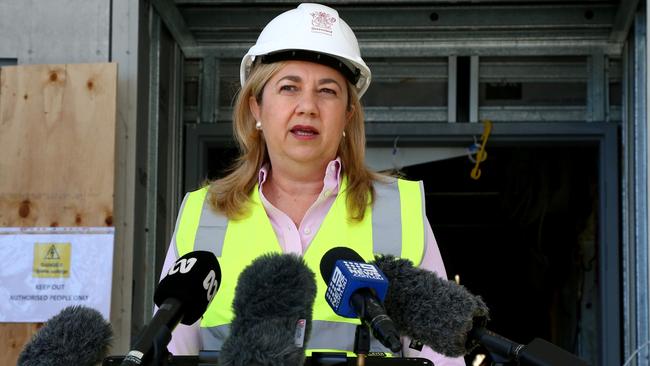IOC stumps up $1bn to honour Brisbane 2032 Olympic Games pledge
Queensland’s Labor government also secured $1bn in funding this week from the federal budget for 2032 Olympics venues.

The International Olympic Committee will put up nearly $1bn for Brisbane to stage the 2032 Games, locking in a key tranche of the operating budget.
The advice was given to the Organising Committee for the Olympic Games and comes as the federal government this week committed $1.07bn over budget forward estimates to develop venues.
The IOC funding is from the Olympics’ broadcast rights and honours its pledge to cover $950m in 2021 dollars of the estimated $4.94bn running costs of the tournament.
“The IOC has confirmed its financial contribution of broadcast-related revenues to the Brisbane 2032 Olympic and Paralympic Organising Committee which is consistent with the amount specified in the Olympic host contract,” an OCOG spokesperson said.
The agency, headed by international businessman Andrew Liveris, is charged with delivering the regionalised Brisbane Games but has no role in developing the required transport infrastructure and venues. Oversight of this rests mainly with the Queensland and federal governments.

Under a revised cost-sharing deal struck between Anthony Albanese and Premier Annastacia Palaszczuk after Labor won last May’s federal election, Canberra bowed out of the $2.7bn rebuild of the Gabba stadium – making it a wholly state project – but funding the $2.5bn Brisbane Arena to host the swimming competition became a federal responsibility. The budget papers verified that the commonwealth’s $2.5bn “investment” in the technically challenging Brisbane Arena project had been capped, raising questions about what would happen if the costs blew out, as they did with the Gabba, which rocketed from the $1bn first cited by Ms Palaszczuk.
The 17,000-seat hall is to be constructed above a railway station on the edge of the CBD, and will deploy a drop-in pool for the Olympics.
The federal government will split the cost of building or upgrading an extra 16 Games venues, with its contribution capped at $935m. The cash from Canberra starts to flow with a $36m instalment in 2023-24, ramping up to $107.9m in 2024-25, $348.4m in 2025-26 and $583.8m in 2026-27.
While the budget carried over infrastructure funding commitments made by the Morrison government for the $1.1bn Kuraby-Beenleigh faster rail upgrade and $1.6bn for the Brisbane-Sunshine Coast rail extension, both projects, seen as important to the Olympics, are subject to a review of big-ticket capital works ordered by federal Infrastructure Minister Catherine King.
The chief of industry think tank Infrastructure Partnerships Australia, Adrian Dwyer, said an integrated transport plan for the Games needed to be fast-tracked. “Key projects like the Beerburrum to Nambour rail upgrade, Logan to Gold Coast faster rail and the Coomera Connector must be progressed so that athletes aren’t playing to empty stadiums outside of Brisbane,” he said.
“With all funding decisions being agreed to by separate approval mechanisms within both the federal and Queensland governments – potentially now a lengthier process – it’s essential there is no delay to creating the integrated transport plan.”
Athletics Australia expressed disappointment that its plea for additional support for competitors to prepare for next year’s Paris Olympics had been overlooked in the budget. “The current stagnated funding is likely to see Australian athletes underprepared for (the) upcoming Paris 2024 Games, due to increased cost to compete which has increased significantly over the past four years,” it said.
Mr Dwyer questioned why the Queensland government had pulled venue and infrastructure development for the Games in-house, despite having flagged to the IOC during the bid process that the multibillion-dollar program would be run by an independent agency, the Olympic Co-ordination Authority.








To join the conversation, please log in. Don't have an account? Register
Join the conversation, you are commenting as Logout